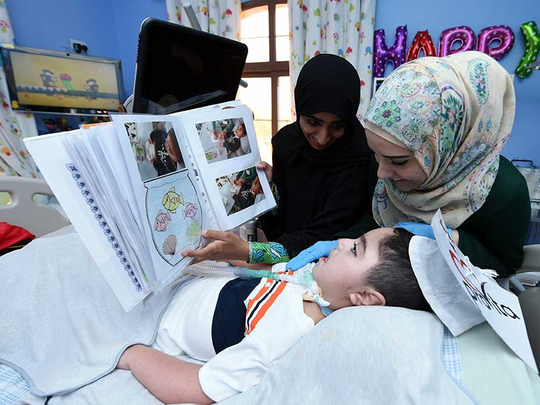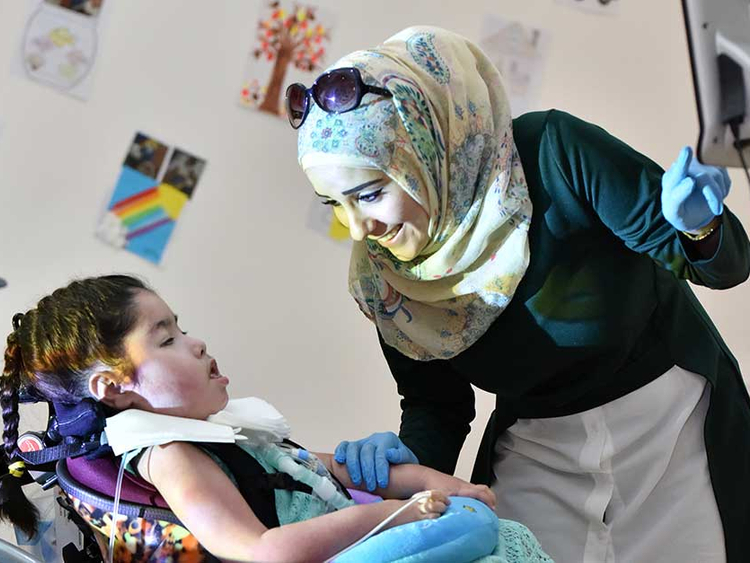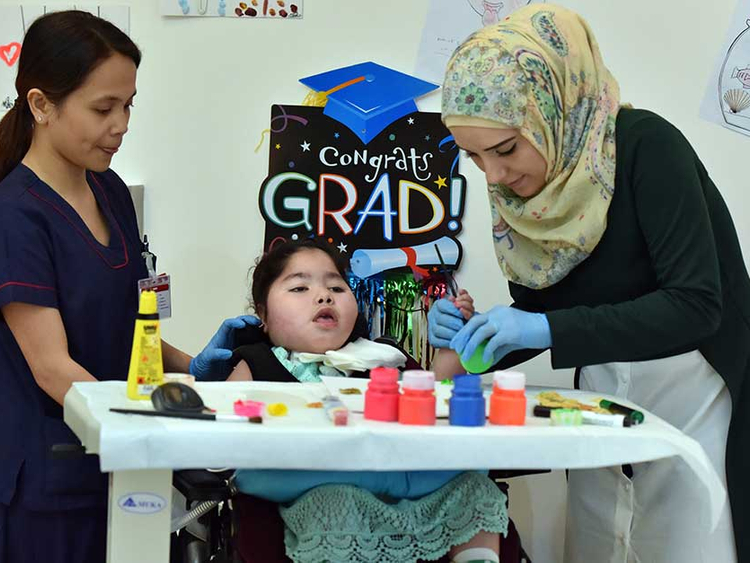
Abu Dhabi: Saeed would sit in his bed watching cartoons and observing people who came into his room. Afflicted by a genetic disorder, he had been unable to move or communicate since birth. But his mother could tell that her little son had so much more to say and learn.
The five-year-old Emirati has now completed a year of learning despite suffering from spinal muscular atrophy, a genetic condition that leaves a patient ‘locked’ in their own bodies.
“My son is very intelligent, with a good memory and quick understanding. Even with this disorder, I have full confidence that he can match any of his peers,” Saeed’s mother, May Al Daheri, a 39-year-old Emirati homemaker, told Gulf News.
Along with Saeed were two other Emirati children, aged six and eight, who are afflicted by the same disorder. The illness has caused the depletion of their motor neurons — the cells that connect the brain and spinal cord to muscles and help control movement — and wasted their muscles.
But with their new learning regimen that is based on a specialised education programme, Saeed and his friends can now recognise a variety of words and concepts.
“The three children are afflicted by a severe form of spinal muscular atrophy, which means that they cannot sit independently, and are always connected to a ventilator for breathing. They cannot write, speak or move independently, but they are able to communicate with their eyes,” explained Alta De Villiers, director of education and training at the ProVita International Medical Centre where they are housed.
The education programme taught the three children basic words and vocabulary, and exposed them to concepts such as colours, body parts and animal sounds. The goal was to improve the children’s quality of life, and to try and harness their intact cognitive functioning.
“It is difficult for an infant diagnosed with this condition to achieve basic milestones, and learning is often greatly delayed because of their inability to move or communicate. However, with early intervention, their cognitive functions can be better preserved,” explained Dr Jamil Itani, paediatrician and medical director at ProVita.
For about two hours every day, each child was exposed individually to educational material by a resident paediatric teacher. According to Dr De Villiers, they have to be taught things starting from the level of a healthy two year old.
“One of the biggest challenges was getting the children to welcome my presence and to trust me. So, in the beginning, I would often just sit with them before we started the lessons and speak to them about their families or read stories and the Quran,” said Nour Ahmad, their teacher.
While it is difficult to ascertain what the children are feeling, Ahmad found that they eventually began to look forward to their lessons, as indicated by their elevated heart rates.
Al Anood Al Mazroui, 29, an Emirati whose daughter Mouza is also afflicted with spinal muscular atrophy, said she can see her daughter’s anticipation to learn more.
“Since the lessons began, she shows little interest in watching cartoons. I used to feel that she was bored earlier, but did not know what more I could do for her. Now, she so loves the lessons that she does not even look forward to the weekends without classes,” Al Mazroui said.
Ahmad said the lessons have so far been limited to one hour in the morning and one in the afternoon because her students cannot sit for too long.
“Now that they have completed a year of learning, and know about 30 to 45 words each, I plan to teach them the alphabet and numbers. This year, we are also working to set up a classroom so that they can all be around one another and perhaps even communicate peer-to-peer,” she said.
The end goal is to enable the children to express their feelings, and use words to have some control over their environment.
“These children feel, just like any other child. The difference is that they are locked in and cannot state their preferences. With such intervention, they may however learn to communicate with words and this would give them much more say on what they like and don’t like,” Dr Itani added.














